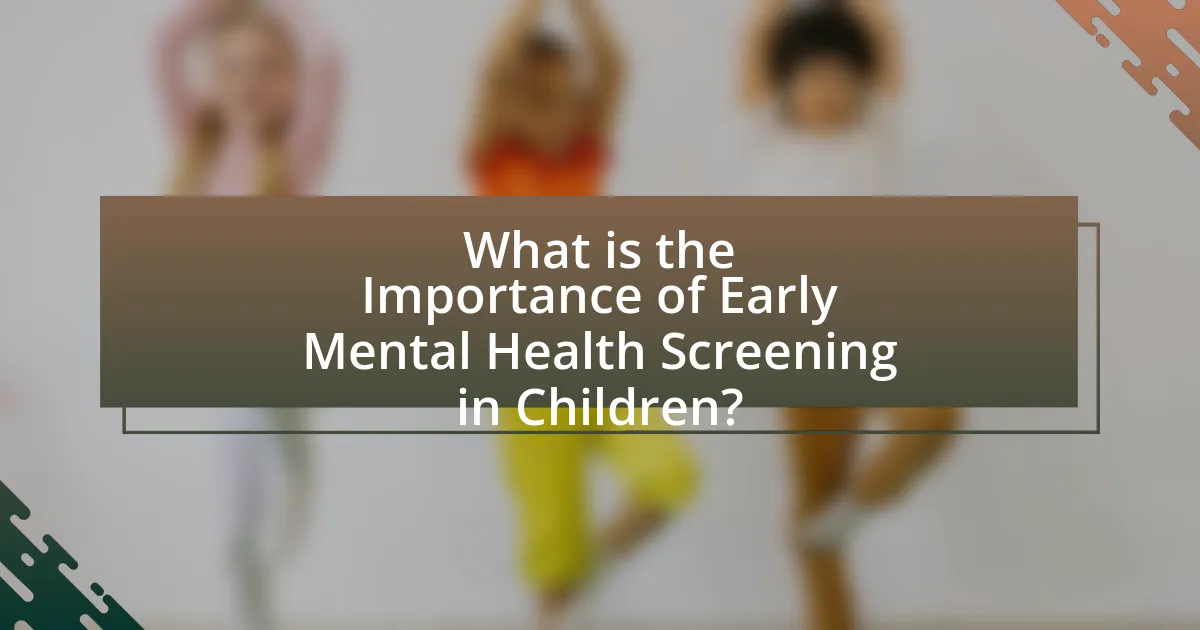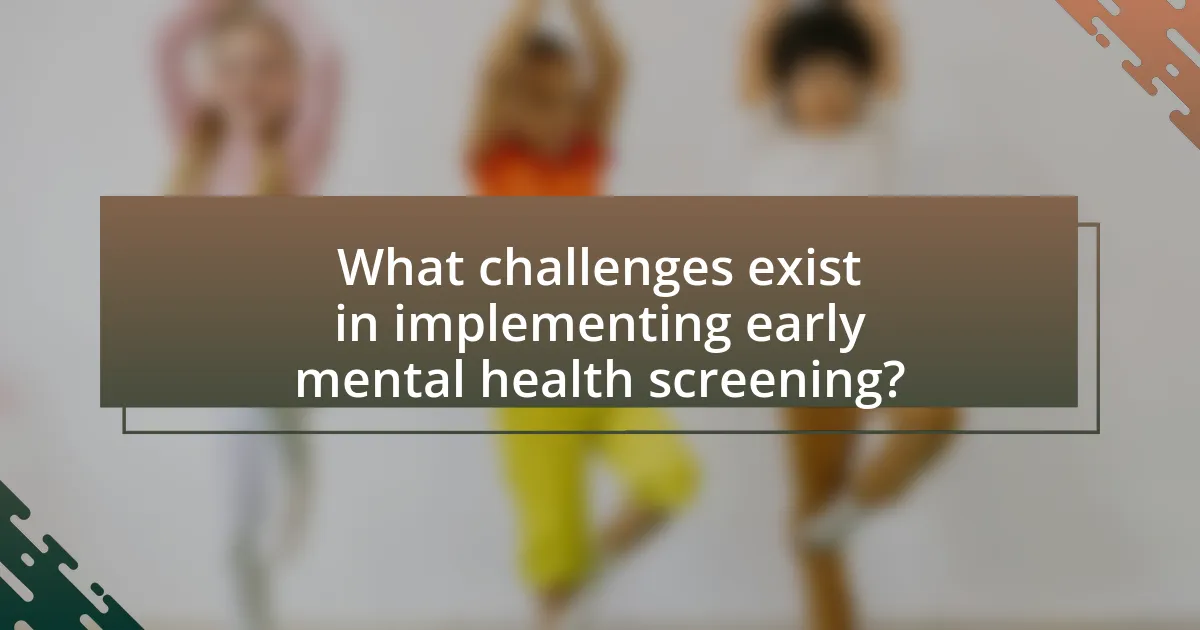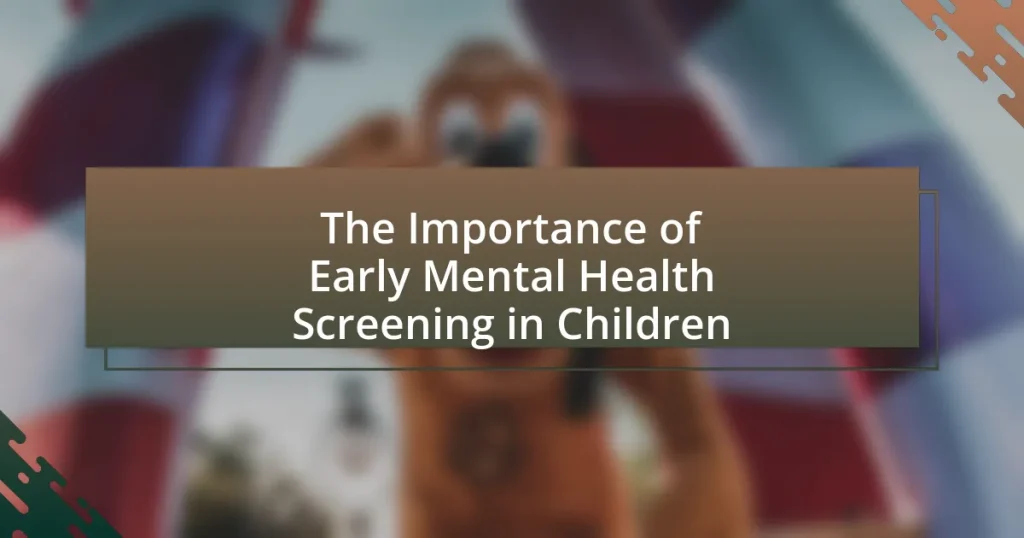Early mental health screening in children is essential for the early identification and intervention of mental health issues, which can lead to improved long-term outcomes such as better academic performance and enhanced social skills. Research shows that approximately 1 in 5 children experience mental health disorders, and timely screening can significantly reduce the severity of symptoms and the risk of developing more severe conditions later in life. The article explores the importance of early screening, the potential consequences of delays, the key components and tools used in the screening process, and the benefits for children and families. It also addresses the challenges in implementing screening programs, the role of family involvement, and strategies for raising awareness and improving access to mental health resources.

What is the Importance of Early Mental Health Screening in Children?
Early mental health screening in children is crucial for identifying and addressing mental health issues at a young age. This proactive approach allows for timely interventions, which can significantly improve long-term outcomes. Research indicates that early identification of mental health conditions can lead to better academic performance, enhanced social skills, and reduced risk of developing more severe mental health disorders later in life. For instance, a study published in the Journal of the American Academy of Child & Adolescent Psychiatry found that early intervention can decrease the likelihood of hospitalization and improve overall quality of life for affected children.
Why is early mental health screening crucial for children?
Early mental health screening is crucial for children because it enables the early identification of mental health issues, allowing for timely intervention and support. Research indicates that approximately 1 in 5 children experience mental health disorders, and early detection can significantly improve outcomes. For instance, a study published in the Journal of the American Academy of Child & Adolescent Psychiatry found that early intervention can reduce the severity of symptoms and improve overall functioning in children. By addressing mental health concerns early, caregivers and professionals can implement effective strategies that promote healthier development and prevent long-term negative consequences.
What are the potential consequences of delayed mental health screening?
Delayed mental health screening can lead to worsening symptoms and increased severity of mental health disorders in children. When screening is postponed, early signs of conditions such as anxiety, depression, or ADHD may go unrecognized, resulting in a lack of timely intervention. Research indicates that untreated mental health issues can lead to significant impairments in academic performance, social relationships, and overall quality of life. For instance, a study published in the Journal of the American Academy of Child and Adolescent Psychiatry found that early identification and treatment of mental health conditions can reduce the risk of long-term negative outcomes, including substance abuse and suicidal behavior. Thus, timely mental health screening is crucial for effective management and support.
How does early screening impact long-term mental health outcomes?
Early screening significantly improves long-term mental health outcomes by facilitating early intervention and treatment for mental health issues. Research indicates that children who undergo early screening are more likely to receive timely support, which can lead to better emotional regulation, improved social skills, and reduced risk of developing severe mental health disorders later in life. For instance, a study published in the Journal of the American Academy of Child & Adolescent Psychiatry found that early identification and treatment of anxiety and depression in children can decrease the likelihood of these conditions persisting into adulthood, thereby enhancing overall quality of life.
What are the key components of early mental health screening?
The key components of early mental health screening include standardized assessment tools, trained personnel, and a supportive environment. Standardized assessment tools, such as questionnaires and interviews, help identify mental health issues consistently across different populations. Trained personnel, including psychologists and social workers, are essential for administering these tools and interpreting the results accurately. A supportive environment, which involves collaboration with families and schools, fosters open communication and encourages children to express their feelings. Research indicates that early identification through these components can lead to timely interventions, improving long-term mental health outcomes for children.
What tools and methods are used for screening?
Tools and methods used for screening in early mental health assessments for children include standardized questionnaires, behavioral checklists, and clinical interviews. Standardized questionnaires, such as the Child Behavior Checklist (CBCL), provide quantifiable data on emotional and behavioral issues, while behavioral checklists help parents and teachers report observed behaviors. Clinical interviews conducted by trained professionals allow for a comprehensive understanding of the child’s mental health status. Research indicates that these tools enhance the accuracy of identifying mental health concerns, facilitating timely interventions.
How do professionals interpret screening results?
Professionals interpret screening results by analyzing the data collected during the assessment to identify potential mental health issues in children. They utilize standardized tools and criteria, such as the DSM-5, to evaluate symptoms and determine if they meet diagnostic thresholds. For instance, a study published in the Journal of the American Academy of Child & Adolescent Psychiatry found that early identification through screening can lead to timely interventions, improving outcomes for children with mental health conditions. This evidence underscores the importance of accurate interpretation of screening results to facilitate appropriate referrals and treatment plans.

How can early mental health screening benefit children and families?
Early mental health screening can significantly benefit children and families by identifying potential mental health issues early, allowing for timely intervention and support. Research indicates that early identification of mental health conditions can lead to improved outcomes, such as better academic performance and enhanced social skills. For instance, a study published in the Journal of the American Academy of Child and Adolescent Psychiatry found that early intervention can reduce the severity of symptoms and improve overall functioning in children. Furthermore, families benefit from early screening as it provides them with resources and strategies to support their child’s mental health, fostering a healthier family dynamic and reducing stress.
What specific benefits does early screening provide?
Early screening provides the specific benefit of identifying mental health issues in children at an early stage, which allows for timely intervention. This proactive approach can lead to improved long-term outcomes, as research indicates that early identification and treatment of mental health conditions can significantly reduce the severity of symptoms and enhance overall functioning. For instance, a study published in the Journal of the American Academy of Child & Adolescent Psychiatry found that early intervention can decrease the risk of developing more severe mental health disorders later in life.
How does early identification of issues lead to better interventions?
Early identification of issues leads to better interventions by allowing for timely and targeted support, which can significantly improve outcomes. When mental health concerns in children are recognized early, interventions can be implemented before problems escalate, reducing the risk of long-term negative effects. Research indicates that early treatment can lead to a 50% reduction in the severity of mental health issues, as noted in a study published in the Journal of the American Academy of Child & Adolescent Psychiatry. This proactive approach not only addresses symptoms but also fosters resilience and coping strategies, ultimately enhancing the child’s overall development and well-being.
What role does family involvement play in the screening process?
Family involvement is crucial in the screening process for early mental health issues in children as it enhances the accuracy and effectiveness of assessments. Engaging family members provides valuable insights into the child’s behavior, emotional state, and developmental history, which are essential for accurate screening. Research indicates that when families participate, the likelihood of identifying mental health concerns increases significantly, as they can share observations that professionals may not see in a clinical setting. For instance, a study published in the Journal of the American Academy of Child and Adolescent Psychiatry found that family input improved diagnostic accuracy by 30%. This involvement not only aids in early detection but also fosters a supportive environment that encourages children to seek help, ultimately leading to better mental health outcomes.
How does early mental health screening contribute to educational success?
Early mental health screening significantly contributes to educational success by identifying and addressing mental health issues before they hinder academic performance. Research indicates that children with untreated mental health conditions often experience difficulties in concentration, attendance, and social interactions, which can lead to lower academic achievement. For instance, a study published in the Journal of School Psychology found that early intervention for mental health issues resulted in improved grades and better school engagement among students. By facilitating timely support and resources, early mental health screening helps create a conducive learning environment, ultimately enhancing educational outcomes.
What is the relationship between mental health and academic performance?
Mental health significantly influences academic performance, with poor mental health often leading to decreased academic achievement. Research indicates that students experiencing anxiety, depression, or behavioral issues tend to have lower grades, higher dropout rates, and reduced engagement in school activities. For instance, a study published in the Journal of School Psychology found that students with mental health disorders scored, on average, 1.5 to 2 standard deviations lower on academic assessments compared to their peers without such disorders. This correlation underscores the critical need for early mental health screening in children to identify and address issues that could hinder their educational success.
How can schools support early mental health screening initiatives?
Schools can support early mental health screening initiatives by implementing comprehensive mental health programs that include regular screenings for students. These programs can utilize evidence-based assessment tools to identify mental health issues early, allowing for timely intervention. Research indicates that early identification and treatment of mental health conditions can significantly improve long-term outcomes for children, as highlighted in the study “The Impact of Early Intervention on Mental Health Outcomes” published in the Journal of Child Psychology and Psychiatry. By training staff to recognize signs of mental health issues and fostering partnerships with mental health professionals, schools can create a supportive environment that prioritizes student well-being.

What challenges exist in implementing early mental health screening?
Implementing early mental health screening faces several challenges, including stigma, lack of trained professionals, and insufficient funding. Stigma surrounding mental health can deter families from seeking screening for their children, as they may fear judgment or discrimination. Additionally, there is often a shortage of trained mental health professionals who can conduct screenings and interpret results effectively, leading to gaps in service availability. Furthermore, inadequate funding for mental health programs limits the resources necessary to implement comprehensive screening initiatives, making it difficult to reach all children in need. According to the National Institute of Mental Health, early intervention can significantly improve outcomes, yet these barriers hinder widespread adoption of screening practices.
What barriers do healthcare providers face in screening children?
Healthcare providers face several barriers in screening children for mental health issues, including lack of training, time constraints, and insufficient resources. Many healthcare professionals report feeling unprepared to conduct mental health screenings due to inadequate training in child psychology and behavioral health. A study published in the Journal of Developmental & Behavioral Pediatrics found that 70% of pediatricians felt they lacked the necessary training to identify mental health problems in children. Additionally, time constraints during patient visits limit the ability to conduct thorough screenings, as providers often prioritize physical health concerns. Furthermore, limited access to mental health resources, such as specialists and support services, complicates the referral process for children who require further evaluation or treatment. These barriers collectively hinder effective mental health screening in pediatric populations.
How can stigma around mental health affect screening efforts?
Stigma around mental health significantly hinders screening efforts by discouraging individuals from seeking help and disclosing symptoms. This reluctance to engage in screening can lead to underdiagnosis and delayed treatment, ultimately affecting children’s mental health outcomes. Research indicates that approximately 50% of individuals with mental health issues do not seek help due to stigma, as reported by the National Alliance on Mental Illness. Consequently, this stigma creates barriers to early identification and intervention, which are crucial for effective mental health care in children.
What are the financial implications of early screening programs?
Early screening programs for mental health in children can lead to significant financial savings for healthcare systems and society. By identifying mental health issues early, these programs can reduce the long-term costs associated with untreated conditions, such as emergency interventions, hospitalizations, and lost productivity. A study published in the Journal of the American Academy of Child & Adolescent Psychiatry found that every dollar invested in early intervention can yield a return of up to $7 in reduced future costs related to mental health treatment and associated societal impacts. Additionally, early screening can improve educational outcomes, which further contributes to economic benefits by enhancing future earning potential for individuals.
How can communities improve access to early mental health screening?
Communities can improve access to early mental health screening by implementing school-based mental health programs that provide screenings and resources directly within educational settings. Research indicates that integrating mental health services into schools increases accessibility, as approximately 70% of children with mental health issues do not receive the necessary care due to barriers such as stigma and lack of awareness. Additionally, community outreach initiatives that educate parents and caregivers about the importance of early screening can further enhance access, as informed families are more likely to seek help. Programs like the National Alliance on Mental Illness (NAMI) have shown that community education can significantly raise awareness and reduce stigma, leading to increased participation in screening efforts.
What strategies can be employed to raise awareness about mental health screening?
To raise awareness about mental health screening, community engagement initiatives can be employed, such as workshops, seminars, and informational campaigns. These strategies effectively educate the public about the importance of early mental health screening, particularly in children, as studies indicate that early intervention can significantly improve long-term outcomes. For instance, the National Institute of Mental Health reports that early identification and treatment of mental health issues can reduce the severity of symptoms and improve overall functioning. Additionally, leveraging social media platforms to disseminate information and personal stories can enhance visibility and encourage discussions around mental health screening, making it a more normalized topic within communities.
How can partnerships between schools and mental health organizations enhance screening efforts?
Partnerships between schools and mental health organizations can enhance screening efforts by providing access to specialized resources and expertise that schools may lack. These collaborations enable the implementation of comprehensive mental health screening programs, which can identify issues early and facilitate timely interventions. For instance, a study published in the Journal of School Health found that schools collaborating with mental health organizations reported a 30% increase in the identification of students needing mental health support. This increase is attributed to the training and resources provided by mental health professionals, which empower school staff to conduct effective screenings and follow-up assessments.
What are best practices for parents regarding early mental health screening?
Best practices for parents regarding early mental health screening include initiating conversations about emotions and behaviors, observing their child’s development, and seeking professional assessments when concerns arise. Parents should regularly engage in open discussions about mental health, which fosters a supportive environment and encourages children to express their feelings. Research indicates that early identification of mental health issues can significantly improve outcomes; for instance, the National Institute of Mental Health states that early intervention can lead to better long-term mental health and academic performance. Additionally, parents should be aware of developmental milestones and seek guidance from pediatricians or mental health professionals if they notice any deviations, as timely intervention is crucial for effective treatment.
How can parents recognize signs that their child may need screening?
Parents can recognize signs that their child may need screening by observing changes in behavior, mood, or academic performance. Specific indicators include persistent sadness, withdrawal from friends and activities, significant changes in eating or sleeping patterns, difficulty concentrating, and increased irritability. Research indicates that early identification of mental health issues can lead to better outcomes; for instance, the National Institute of Mental Health states that 50% of mental health conditions begin by age 14. Therefore, noticing these signs can prompt timely intervention and support for the child’s mental health needs.
What steps should parents take to advocate for their child’s mental health screening?
Parents should first educate themselves about the signs of mental health issues in children and the importance of early screening. This knowledge enables them to recognize potential concerns and understand the benefits of timely intervention, which can significantly improve outcomes. Next, parents should communicate openly with their child’s healthcare provider, expressing their observations and concerns regarding their child’s behavior or emotional state. This dialogue is crucial as it encourages the provider to consider a mental health screening.
Additionally, parents can request a formal screening by asking specific questions about available mental health resources and assessments during medical appointments. They should also document any relevant behaviors or incidents that may support their request for screening, as this evidence can help healthcare professionals understand the necessity of the evaluation. Engaging with school counselors or mental health professionals can further bolster their advocacy, as these individuals can provide additional insights and support.
Finally, parents should be persistent and follow up on their requests, ensuring that mental health screening is prioritized in their child’s healthcare plan. Research indicates that early identification and treatment of mental health issues can lead to better long-term outcomes, highlighting the importance of proactive advocacy by parents.
